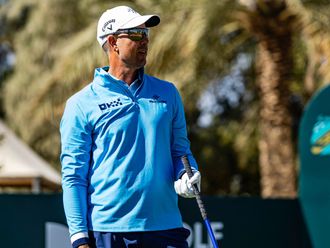Dubai: A top official from the world governing body for Para-Badminton has predicted a close fight for medals between Asian and European nations when the sport makes its Olympic debut at the 2020 Tokyo Paralympics.
Paul Kurzo, vice-president of BWF Para-Badminton, who was in Dubai for the inaugural Fazza Dubai Para-Badminton International 2018 that concluded at the Shabab Al Ahli Dubai indoor hall in Al Mamzar on Sunday, said that the results of this competition indicate that once again it will be a tussle for dominance in medals between shuttlers from the two continents.
“Asia has always been a strong power in badminton and will continue to be so. There may be some sort of fight from South American countries, but countries from Africa and Oceania really have a chance as the level of play in those regions is far below,” Kurzo said.
“It would be nice to see African and Oceania nations try and match athletes from Europe and Asia. But the fact is that countries from Asia and Europe have made huge strides in Para-Badminton and it will be difficult for these nations from Africa and Oceania to catch up within the next two years before the Tokyo Games.”
Para-Badminton players from Asia and Europe tussled in 15 categories over five days of competition at the Fazza Dubai Para-Badminton International 2018. It was honours even between the two continents with Asia and Europe winning three golds apiece in the men’s singles events. However, Asia took both the gold medals in the men’s doubles and Indonesia’s golden girl Leani Ratri Oktila capped a brilliant run in the women’s competitions winning three gold medals to leave the Europeans far behind.
The qualifying process for the 2020 Tokyo Paralympics will commence from January 2019 with various rankings tournaments all over the world. “The qualifying process is not going to be easy for any of these athletes,” Kurzo cautioned.
“The decision to include Para-Badminton as one of the disciplines was taken in 2014, but our sport started to change and become more competitive much before that. Today, we not only have the numbers but also several top-class champions who can compete at a very high level. They function as any other able-bodied athlete and this is what is going to make the qualifying process even tough,” he added.
Kurzo was particularly pleased to see the UAE lead the way in the development of the sport for the entire region. “Three years back this area was a white spot for us. Today we have some of the top tournaments coming here where players from the country and the region get a chance to watch world champions in action and get motivated to play the sport. The result is that badminton is in a much better position than what it was a few years back,” the BWF official said.
“Our work is still not done. We have a long way to go still. We are proud of what we have done so far, but we need to develop this region even more, and one day we may have a champion who will thrive at the top of world badminton.”










